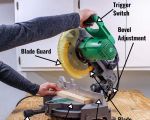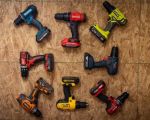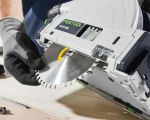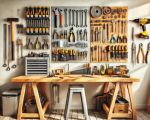The Best Power Tools for Woodworking: Essential Tools for Every Workshop
When it comes to woodworking, having the right tools can make all the difference. Whether you’re a seasoned professional or just starting out in the craft, investing in the best power tools for woodworking is essential for achieving precision and efficiency. In this guide, I’ll walk you through some of the most important power tools for woodworking, their uses, and how they can help you take your woodworking projects to the next level.
1. Circular Saw: Versatile and Powerful
The circular saw is one of the most essential power tools in any woodworking shop. It’s incredibly versatile and can be used for a variety of cutting tasks, including straight cuts, bevels, and crosscuts. I’ve found that a high-quality circular saw can make quick work of even the toughest materials, and with the right blade, it can easily handle wood, plywood, and other materials commonly used in woodworking.
When choosing a circular saw, pay attention to the size of the blade and the motor’s power. A larger blade is typically better for making deep cuts, while a more powerful motor ensures that the saw can handle tough materials without bogging down.
2. Jigsaw: Precision for Curves and Detail Work
The jigsaw is another must-have power tool, especially for intricate cuts and detailed work. This tool is perfect for making curved cuts, cutting along lines, and even performing plunge cuts. In my experience, a jigsaw is perfect for cutting out shapes for cabinetry, decorative elements, or any project where precision and control are important.
When shopping for a jigsaw, look for features such as variable speed settings, orbital action for faster cutting, and a dust blower to keep your work area clear. With the right jigsaw, you’ll have the freedom to make creative and detailed cuts with ease.
3. Power Drill: Essential for Drilling and Driving
No woodworking shop is complete without a reliable power drill. Whether you’re drilling holes for screws, dowels, or other fasteners, a power drill is an essential tool for almost every woodworking project. I personally prefer drills that offer both drilling and driving functions, as they allow me to easily switch between tasks without needing a separate tool.
Look for a drill with adjustable torque settings, as this will help you control the power output for delicate materials and prevent overdriving screws. Additionally, choosing a cordless drill with long battery life will provide the flexibility to work in various locations without worrying about a power source.
4. Random Orbital Sander: Perfect for Smooth Finishes
A random orbital sander is a must-have for anyone who wants to achieve smooth, even finishes. This tool is perfect for sanding large surfaces and removing rough edges or imperfections from wood. I’ve found that the random orbital sander’s motion helps minimize swirl marks, leaving behind a clean and polished surface.
When shopping for a random orbital sander, look for one with adjustable speed settings to suit different types of wood and finishes. Additionally, make sure it’s comfortable to hold, as you’ll likely be using it for extended periods.
5. Table Saw: The Heart of Any Woodworking Shop
The table saw is often considered the heart of a woodworking shop, and for good reason. It’s incredibly accurate and can handle a wide variety of cutting tasks, from ripping large boards to making crosscuts and bevels. If you’re serious about woodworking, a high-quality table saw is an investment that will pay off in terms of precision and ease of use.
When choosing a table saw, consider factors such as the motor’s horsepower, the size of the table, and the type of fence system. A solid fence system will help you make straight, accurate cuts every time.
6. Miter Saw: Perfect for Angled Cuts
A miter saw is essential for making precise angled cuts, particularly for trim work, picture frames, and crown molding. The ability to adjust the angle of the saw allows you to create professional-looking cuts with ease. I’ve found that a compound miter saw, which offers both bevel and miter adjustments, is ideal for more advanced cuts and versatility.
When choosing a miter saw, make sure it has a sturdy base and smooth adjustments. A larger blade diameter will also allow you to make deeper cuts, which is important when working with thicker materials.
7. Router: For Decorative Edges and Fine Detailing
The router is a fantastic tool for adding decorative edges to wood pieces and performing fine detailing work. I’ve used routers to create custom moldings, rounded edges, and even hollowed-out areas in wood. It’s also great for joinery, such as making dado joints or rabbets.
When selecting a router, consider the motor’s power and the range of bits available. Variable speed settings are important for controlling the depth of cut, while a plunge router offers more versatility for intricate cuts.
8. Dust Collector: Keeping Your Workspace Clean
While not technically a tool for woodworking, a dust collector is a critical addition to any workshop. The dust produced by power tools can be harmful to your health and can make your workspace cluttered and unsafe. A dust collector helps capture dust and debris, keeping your workspace clean and your lungs safe.
Look for a dust collector with a strong suction system and a high-capacity bag to reduce the frequency of emptying. Additionally, choose a model with wheels for easy mobility around your shop.
Conclusion: Finding the Best Tools for Your Woodworking Projects
Choosing the right power tools for woodworking can be overwhelming, but it’s important to select tools that suit both your needs and your budget. From circular saws to table saws, each tool has its own unique role in creating professional-quality woodwork. As you gain more experience, you may find that upgrading your tools is the key to achieving even better results in your projects.
If you’re looking for high-quality tools, be sure to check out the wide selection available at ToolNest for all your woodworking needs.









